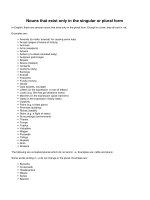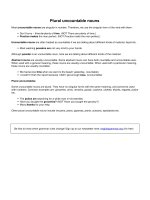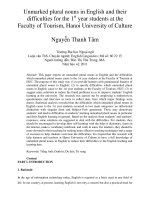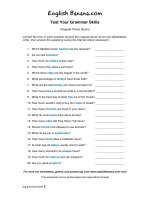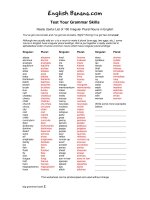UEfAP plural nouns
Bạn đang xem bản rút gọn của tài liệu. Xem và tải ngay bản đầy đủ của tài liệu tại đây (71.55 KB, 1 trang )
UEfAP Plural Nouns
In English nouns and verbs can be described as singular or plural, depending on the number of things
being referred to. For example “report” is singular, “reports” is plural. Plural nouns are common in
academic writing (Biber, Johansson, Leech, Conrad & Finegan, 1999, p. 291292).
For example:
Where it comes to narrowing the many scientific uncertainties involved in climate models, there is
much left for scientists to do. A priority for the future must clearly be expanding international
research and monitoring efforts. But this should not be as some world leaders would seem to like
a substitute for policy actions. Scientists are generally confident that they can narrow down some of
the uncertainties with time. But, as the IPCC scientists concluded in their report, "considering the
complex nature of the problem and the scale of the scientific programmes to be undertaken we
know that rapid results cannot be expected. Indeed further scientific advances may expose
unforeseen problems and areas of ignorance." The leader of the Princeton University climate
modelling team, Professor Suyukuro Manabe, put it more graphically at the 1990 American
Association for the Advancement of Science Meeting: "we are never going to have a perfect model.
And even if we had one, we wouldn't know we had it."
Exercise
Try this exercise: Plural Nouns
/>
1/1





